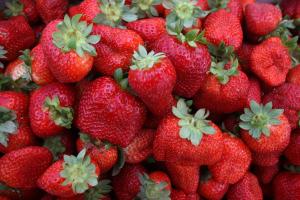DURHAM, N.H., Aug. 23 (UPI) — It took four years, but researchers at the University of New Hampshire have finally finished mapping the genetic history of the cultivated strawberry.
Scientists focused on one of the closest wild relatives of the modern cultivated strawberry, Fragaria iinumae. Unlike other wild species and cultivated strawberries, which have as many as seven different chromosomes, Fragaria iinumae boasts diploid cells, with two homologous copies of each of its two chromosomes, one from each of its parents.
Researchers used a technique called marker-assisted mapping to trace the history of the wild strawberry’s chromosomes.
“This remarkable genetic map, which is the highest resolution linkage map for any ancestral diploid strawberry species, is a valuable research tool,” UNH researcher Lise Mahoney said in a news release.
The results of the genomic analysis was published this week in the journal The Plant Genome.
“Many people are trying to understand the ancestry of the cultivated strawberry so that they can better understand traits associated with specific genetic markers, such as fruit quality, flowering habits, and resistance to diseases,” Mahoney continued. “Defining the genomes of the cultivated strawberry’s wild ancestors will ultimately help guide the use of genetic information in breeding for a better cultivated strawberry.”
Researchers hope to use their new genetic map to develop new strawberry varieties that are specifically designed for thrive in local soils and under organic growing practices.

COMMENTS
Please let us know if you're having issues with commenting.